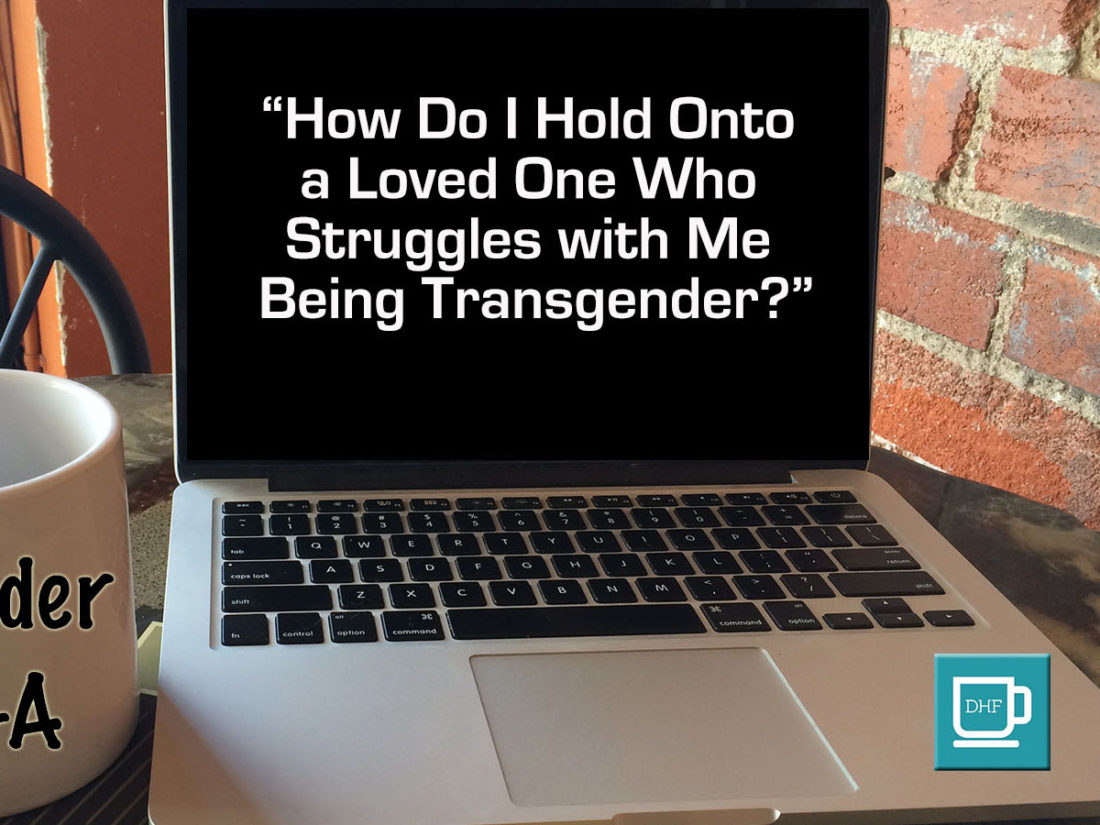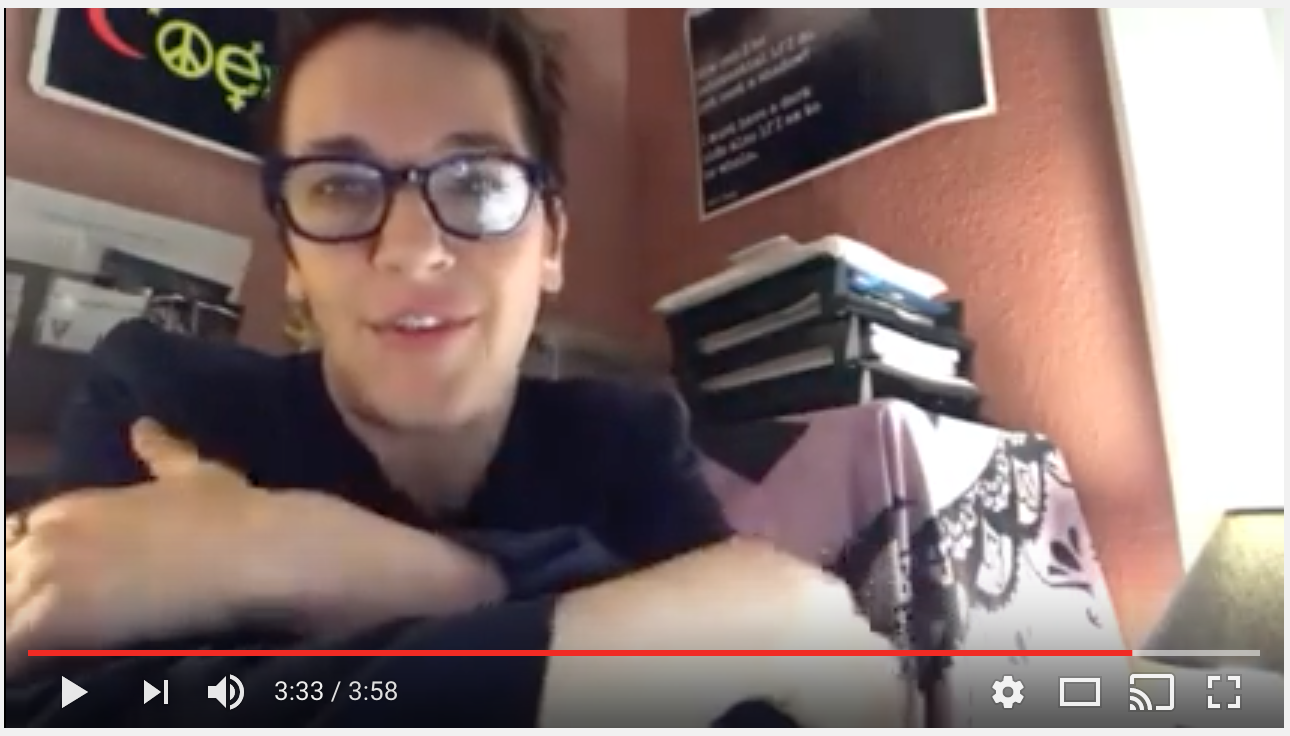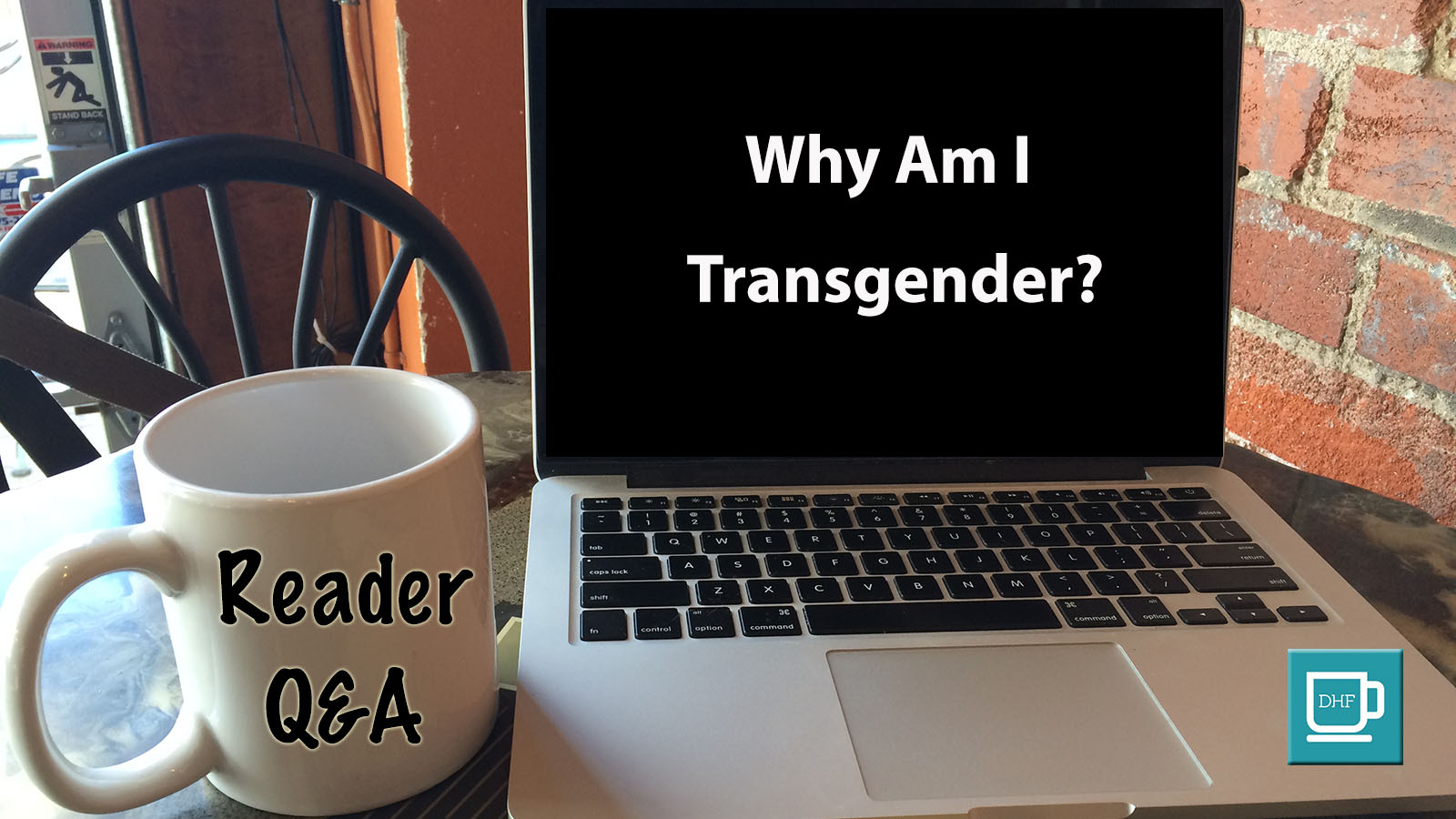
Reader Q&A: “How Do I Hold Onto a Loved One Who Struggles with Me Being Transgender?”
This week’s letter is from a reader wrestling with the question:
“How do I hold onto a loved one who struggles with me being transgender?”
The reader is in her 60’s, has been with her spouse for twenty-eight years, and is desperately trying to hold onto her marriage. She says,
I don’t want a divorce and, frankly at this stage in life, don’t even see a way for us financially to go our separate ways even if that was the most sensible thing to do. We do love each other deeply, but our minds about gender are clearly not that similar.
She explains that her wife was “initially okay with my revelation that I identified as female,” but it has become increasingly more difficult for her over time. In particular, she says that her wife “has issues that have to do with how my behavior reflects on her and her own self-image.”
The reader is sympathetic to what her wife must be going through,
…how hard it is to be in a relationship with someone you always believed was a man who finally tells you that they are a woman. It’s not just my problem, it’s hers as well, and she never asked for this.
She talks about how they have found ways to compromise with one another. For instance,
I managed to get better control of my dysphoria when I made a decision that I would no longer buy or wear clothing that was designed for men. Even though my apparel doesn’t point to me being a transwoman, it somehow allows my mind to put aside a major source of anxiety for me that has been there for my entire life.
In this way she isn’t “out” as a transwoman, but she is also able to stay away from clothing that makes her feel uncomfortable.
However,
…the part she really has issue with is when I am Facebook friends with other trans people.
She said, “I view (talking to trans friends on Facebook) as a way to better understand myself through sharing with other people on similar journeys,” but her wife sees it as her “sneaking around.”
She deactivated her Facebook account for a time in an attempt to acquiesce to her wife’s wishes, thinking it was something she could live without. However, she found herself back on again after six months. She knew, if discovered, this would create “yet another relationship crisis.” Her wife did indeed find out that she was back on Facebook and,
…issued an ultimatum that I decide what I want or she’s moving on.
The reader recognizes that this situation isn’t healthy for either of them. She feels that this “cycle” that they go through is her own doing because, “I need a healthy means to feel safe in my own skin” by having others to talk to about this, but she doesn’t know how to do it without upsetting her wife.
She concludes,
…there must be some way for those of us trying to navigate shark-filled waters long after coming out to a spouse. I can’t seem to accept that divorce has to be the answer when people do love each other.
Dara’s Response:
Dear Reader,
I hear a lot stories about the challenges that people face when they come out as transgender. I’ve noticed that stories like yours—coming out as transgender to your spouse after being together for many years—have a unique set of difficulties that need to be taken into account.
Those of you who grew up during the “pre-internet years” (as one of my clients in her 60’s has coined it) had very little, if any, access to information to help explain what it was they were experiencing.
Therefore, the awareness of being transgender was either non-existent or repressed.
Many of those who are transgender and were born and raised in the “pre-internet years” either never fully acknowledged their feelings on a conscious level or, if they were aware that they existed, hoped that they would go eventually go away.
I sense this is, at least in part, what you’ve experienced. This would explain why you married to your wife with the intention of always being a “man” to her, the thought never crossing your mind that you would eventually come to the realization that you were truly a woman.
Eventually, with enough information, self-reflection, and support you were finally able to tell her the truth. There’s no way your life, your wife’s life, or your relationship, can ever be the same after a revelation like this. However, keeping this truth to yourself would have eventually led you to behaviors that would have sabotaged the relationship, and more than likely led you down a path of self-destruction.
As difficult as it was for both of you, you had to come out to your wife.
After having been together for as long as you have been, a re-evaluation of who you are as individuals and as a couple is taking place. I use present-tense because, even though it sounds like you’ve been out to her for a while, navigating this sort of change takes time, and is still happening for both of you.
Let’s take a look at what you’ve been through so far together.
In your letter you said you and your wife had found a compromise where you could wear clothing that, although not obviously made for women, are neutral enough for you to feel comfortable in. This sounds like you two have been through a “period of negotiating” and were able to reach a solution that could be satisfying for you both. This gives me hope that perhaps the Facebook situation is one in which a compromise could be reached as well.
However, I think it may be more emotionally charged, for both of you, and will require an deeper level of communication and sharing, as well as even more time and patience.
If this were a couples counseling session, I would ask your wife what it is that she is afraid will happen if you continue to have connections with other trans people. In particular, you mentioned she said you needed to “decide what you want” or you have to go your separate ways. Find out in more detail what she means by that (and if there’s any way you could get the assistance of a couples counselor I would highly advise that!)
Once you find out more about her fears you can let her know that you understand where she is coming from (as long as you really do), and address that concern first. Once she feels she has been heard, you can then begin to share why it is that having trans people to connect with is of such help to you.
As you talk together about this, see if there are ways that you can compromise so some of her fear might be reduced, and you are able to stay connected to your trans friends.
Since I’m not sure what her fear is I’m not sure what that might look like, but an example would be if you were to introduce her to a few of the people you are talking to online (if she wants to be more included, if she is having issues with trusting the people you are talking to, etc.). Or, if she is afraid that you talking to them will lead to you wanting to come out more publicly, talk with her about how your online connections are a way for you to express your authentic self privately, which reduces your need to come out more publicly (again, only say this if this feels true to you).
As you work on a compromise with her, keep in mind that you are still carrying a lot of guilt around being transgender.
If you make decisions from a place of guilt, it will eventually lead to you sacrificing as opposed to compromising. Sacrificing will lead to resentment and/or to still secretly doing what you said you wouldn’t do. If you can get everything out in the open and gain more clarity with one another about where you are each coming from, you won’t have connect with your Facebook friends in secret anymore.
My last thought is for you both to take a look at how your relationship is now, in general. Are you setting aside time to do things together that you enjoy? Are you communicating your wants and needs to each other in other areas of life? Are there additional stressors in the relationship that need more attention? Do you need to work on re-connecting as a couple?
You had to live your life for many decades unable to be the woman are truly are. Your wife thought she was married to a man for several decades, but actually wasn’t. This hasn’t been easy for either of you.
Finding your own, unique answer to this issue as a couple is possible.
Be sure to give it time, patience, communication, and understanding.
I truly wish the best to you both!
*This edition of “Reader Q&A” has been created with the expressed permission of the writer of the letter.







Elaine Silverman
September 12, 2016 at 2:51 PMDear Dara …
In regards to your latest blog post, the Q&A … I have been there. After 25 years, my spouse “came out” to me, but I had to guess first. I understand now how very afraid she was. Not only of telling me – my reaction and also of the potential consequences – but because she had no idea what was really going on inside her. We are in our 60’s, and everything you wrote in the beginning of that post is exactly what my spouse was thinking and what she was going through. She was very afraid. And after finding out who she really was, so was I.
I remember having the same fears as the wife did. I thought my “Husband” was gay and was going to leave me. ( I know now that some are, and some do… And I say that with the backwards understanding of what that means.) I didn’t know who all these strange people were, and I was sure they were base and deviant and they would drag my husband, as I knew my spouse at that time, away from our comfortable family values. I did not understand why my husband needed friends that we never had together who were friends that I did not need. My comfortable security was threatened by transgender friends that were not mine . My trust in my spouse was threatened, not by the confusion of the past, not because she did not tell me who she was – I realized she did not even know who or what she was, herself. Instead, my trust was threatened because everything that was normal, that was stable, became different. Suddenly. Suddenly I realized that I did not know who she was. And I was afraid. Afraid that our relationship would disappear. And I tried to keep it from falling apart by making demands on things I felt would keep the stability. The stability that I recognized and felt comfortable with.
I came to realize that true, unconditional love would not make demands. I came to understand that love would let the other person be who he… in this case, she… really was. Really is. I recognized the fear she had in speaking with me, in communicating… She always was that way. I recognized my own fear, my own proclivity to not say what I’m thinking and not ask what I’m wondering. I decided… Right when we were teetering on the verge of going our own way, I decided to just try a different approach. I could not have done it without her, because she was the one who changed first. She was the one who made the first move. She was the one who became vulnerable, she was the one who put everything she had on the line. We began slowly trusting each other, and saying what we thought and what we felt. And we began falling in love all over again.
Fast forward, I am still here, we are still together, and we often shed tears thinking of how each of us, in our own way, might have just thrown it all away. She is free to be herself. I am definitely not a lesbian. I cannot explain it and I do not know why, but she is attractive to me. No other woman, is now or ever has been, attractive to me. But I love my spouse. We finally have the relationship I always craved but never could have because I felt she was keeping something back from me. She was. But no more. I love her soul. I am not a lesbian… But I am a wife who has a wife and I love her.
Communicate. Communicate. Communicate. Always. About everything. Ask questions. Give truthful answers.
Emma Sweet
September 13, 2016 at 3:11 AMWhat a fantastic and, for me, timely post. My wife and I have also been gradually acknowledging my trans nature and it has been tough but also rewarding. Last week, though, she inadvertently discovered that I also have an online presence and communicate with other trans people. Not in any way like “affairs.” Just mutual support, encouragement, and dialogue. But this discovery was very difficult for my wife. Very hard for me as well as I saw myself yet again causing so much pain.
We are getting better though. I’m not 100% open with her in every way, and I promise to always be that way. I am very grateful to be married to her.
I am also so grateful for your book, Dara. That, and the workbook, are so phenomenal. In some ways I get scared that I won’t “do it right” or get stuck. I’m about a quarter of the way through and now I’m excited by the prospects of really understanding myself. My problem now is allowing myself to go slowly and patiently. I don’t want to rush things.
Thank you,
Emma
Emma Sweet
September 13, 2016 at 3:13 AMOops, I meant to say I’m ‘now’ 100% open, not ‘not 100%’ open. Please edit this for me if you can!
Jane
September 13, 2016 at 12:31 PMThe hardest aspect for the trans person is feeling safe to communicate with their spouse. The cis spouse’s anger and hurt quickly contaminates any discussion in my experience.. Fearing loss of the love of my life, I tried to close off my own feelings and accepted my ownership of the betrayal my wife was feeling. I realize now that continued guilt and shame resulted a total loss of my inner voice and was self-betrayal. I felt isolated from everyone including my spouse. All that remains is a sense of my own betrayal and abandonment by my cis spouse. Not fair, I know, but despite being trans, I’ve spent decades putting everyone else’s feelings and importance ahead of my own. My spouse was unwilling to go to counseling with me, and I think that was the tipping point that later killed our marriage. While totally recognizing the flood of emotions that my spouse felt, I was unable to help her to see me as a human being with valid needs without a coach to help us really communicate with each other. Regardless of what cis partners feel about their trans partner’s validity, please, please, accept the help of an experienced therapist to ensure that you communicate with your partner. I will never know whether things could have turned out differently, but you don’t have to live with that; get help and then no matter how things turn out, you will at least have given it your best.
Jeorgia Robison
September 16, 2016 at 12:47 PMMy marriage of thirty years ended, largely because I was not a happy person as a man, but also because of my wife’s belief that she needed to be married to one. I could not change either of those things and the marriage ended. There are worse things, but they all involve someone’s funeral.
Twelve months later I began to transition. I am so much more at ease, from day to day the baggage is less and the days are easier than they used to be. Nonetheless even now, four years from the time my marriage fell apart the divorce still pains me. I tried everything I could think of to make it work, and then some. I am not used to losing, and do not give up a fight, easily. Still the therapist said we both had “evolved”.
My mistake consists in being prepared to compromise everything, including being trans, in order to stay married. These were promises I could not keep. What I really wanted was not at all possible. Had the marriage ended sooner, I believe I would still hurt the same but I would have wasted less time,
I’m in my middle 50’s the prospects of being alone for the rest of my days weighs heavily, but it is bearable. I do not have constant pain and tension in my life, and all in all I’m better off.
I would encourage you to try as hard as is possible. See if your wife will get used to having a Trans-woman spouse. The fact that you are Trans is not going to change. It must be her attitude that changes for you marriage to continue. Her attitude is out of your control.
Prepare yourself emotionally and financially. Don’t promise things you can’t do.
Joanna
September 29, 2016 at 2:36 AMVery useful post as I am approaching my mid fifties and did grow up in those pre-internet days. My own marriage did not survive although we had other issues as well. I must say that these late in life discoveries are not easy for either partner and there are no perfect solutions. Much of this is also about examining our own prejudices and ideas about gender and what we are prepared to tolerate and look past to see the true person inside. It’s easier for me that I am alone to explore my transgender nature but it is of course not the ideal I hoped for. Such is the complexity of life and Hunan relations.